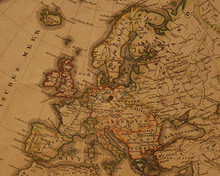
"At that time, the problem had just appeared," she told Journalism.co.uk. "However, in recent years the number of sham marriages has increased dramatically, reaching epidemic proportions. Ireland has become the main destination for hundreds of poor and desperate Latvian women, lured by the promise of just one or two thousand euros to marry a Pakistani or an Indian."
Last year, concerned by what appeared to be a growing trend, Aleksandra decided to turn her findings into a book. She claims to have uncovered around a dozen organised crime networks procuring sham marriages in Ireland during a year of research, but not until she followed the story to Ireland would her investigation be complete.
With help from the European Fund for Investigative Journalism, which aims to help journalists carry out research projects in Europe, she got in touch with Jamie Smyth, social affairs correspondent for the Irish Times, who had previously reported on the sham marriage industry as the paper's European correspondent. With Jamie on board and a grant from the fund behind them, the two colleagues began their collaborative project.
"Working together enabled us both to identify contacts in each other's countries that would have been difficult or impossible to source while working on our own," Aleksandra told Journalism.co.uk.
"In August 2010, I travelled to Dublin with the fund covering my travel expenses. Jamie secured my interviews with a marriage registrar and immigration service representatives, as well as shared interview material with the chief of police and an interpreter working at the weddings.
"The trip to Ireland also allowed me to spend several days with a Pakistani sham marriage broker and his friends. This was a unique and risky experience that enabled me to enlighten some hidden aspects of sham wedding scams. A month later, Jamie travelled to Latvia. I put him in contact with several women who got caught up in the scam, government officials, and the police. Cooperation also removed the language barrier problem, which would have made interviews in Latvia difficult for Jamie. I was able to do Latvian-English interpretations for several interviews in Latvia."
The doors opened to each journalist by the other were invaluable, Jamie told Journalism.co.uk.
"Quite simply I don't think either of us could have covered so much ground and got such a deep insight into the sham marriage scam without teaming up together.
"I don't think I would have been able to uncover the deep dissatisfaction of the Latvian authorities without the contacts that Aleksandra provided for me. She also provided invaluable access to Latvian women involved in the scam. I provided her with some key Irish contacts, who I think gave her a real insight into the Irish government's views and the frustration felt by marriage registrars in Ireland who have few powers to stop the weddings."
"The sham marriage scam cuts across several EU states. It also involves a complex interrelationship between EU law and national law, which is best unravelled by working with colleagues from other countries," he added.
With her book now thought to be in its final stages, Aleksandra hopes to see more cross-border projects in the future.
"Our cooperation was extremely successful and I am very grateful to the Fund for making it available. Huge cross-border stories like ours definitely require cooperation of journalists working in different countries. Europe is getting closer, and so its journalists should too. We have now become one large family facing common problems. I truly hope EU-wide investigative journalism will develop further and there will be more cross-border stories covering complicated and often fascinating matters. In the future, I would be glad to participate in similar projects, as there is no lack of topics to investigate."
Follow the links to read their articles printed in the Irish Times, can be viewed below:
'Ireland's sham marriage scam' Saturday 9 October 2010
'Trapped in a sham marriage' Monday 11 October 2010
'Couple go to High Court with sham marriage decision' Monday 11 October 2010
Comment: 'Ireland must take action to stop sham marriages' Tuesday 12 October 2010
Image by Paul Simpson on Flickr. Some rights reserved.
Free daily newsletter
If you like our news and feature articles, you can sign up to receive our free daily (Mon-Fri) email newsletter (mobile friendly).
Related articles
- Workflow tips in participatory journalism, with Annie Slemrod and Nuha Al-Junaid
- New investigative project helps resource-poor newsrooms report on health
- New Scottish collaborative publication launched to "lessen the load" on independent titles
- How AI can support your journalism
- Help the Bureau Local to investigate covid grants fraud









